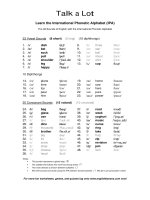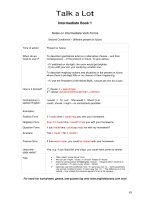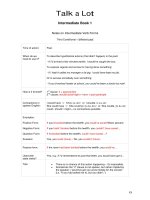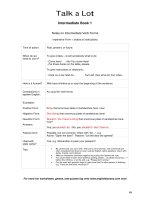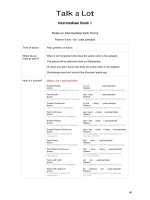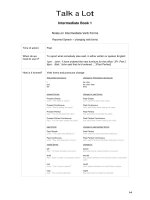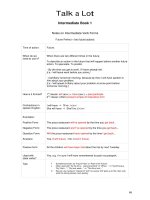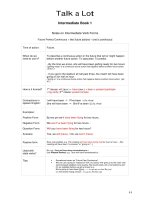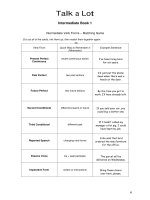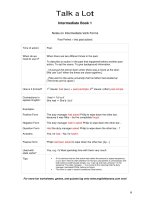talkalot intermediate book 1 third conditional
Bạn đang xem bản rút gọn của tài liệu. Xem và tải ngay bản đầy đủ của tài liệu tại đây (478.14 KB, 1 trang )
Talk a Lot
Intermediate Book 1
Notes on Intermediate Verb Forms
Third Conditional = different past
Time of action:
Past.
When do we
need to use it?
To describe hypothetical actions (that didn’t happen) in the past:
- If I’d arrived a few minutes earlier, I would’ve caught the bus.
To express regrets and sorrow for having done something:
- If I hadn’t called my manager a fat pig, I could have kept my job.
Or to accuse somebody over something:
- If you’d worked harder at school, you could’ve been a doctor by now!
How is it formed?
1st clause: if + past perfect
2nd clause: would/could/might + have + past participle
Contractions in
spoken English:
I would have Ö I’d’ve L~fKÇ]îL= or I woulda L]KïrKÇ]L=
She could have Ö She could’ve Lp]KârKÇ]îL or She coulda Lp]KârKÇ]L
could / should / might = no contractions possible
Examples:
Positive Form:
If you’d booked before the twelfth, you could’ve saved fifteen percent.
Negative Form:
If you hadn’t booked before the twelfth, you couldn’t have saved…
Question Form:
If I’d booked before the twelfth, could I have saved…?
Answers:
Yes, you could (have). / No, you couldn’t (have).
Passive form:
If the room had been booked before the twelfth, you could’ve…
Used with
state verbs?
Yes, e.g. If I’d remembered to post that letter, you would have got it...
Tips:
•
•
There is no chance of this action happening – it’s impossible.
Sometimes the “if” clause is not spoken, but rather implied by
the speaker: I would’ve got you some tickets for the concert.
[i.e. “If you had asked me to, but you didn’t.”]
13
